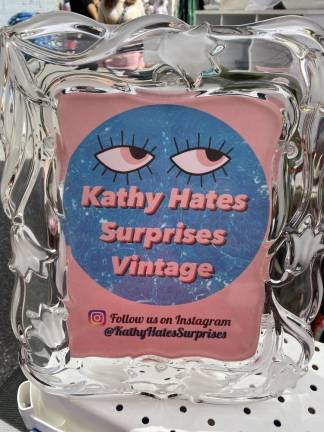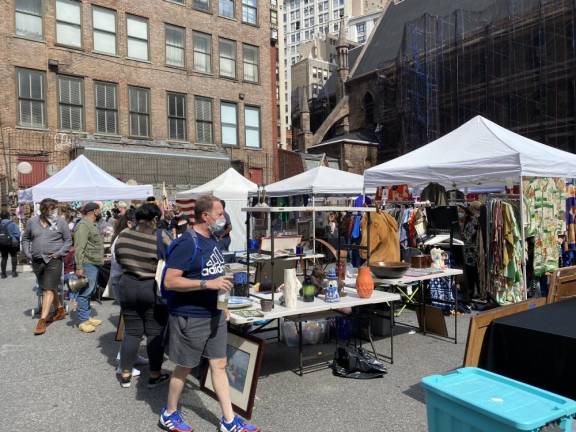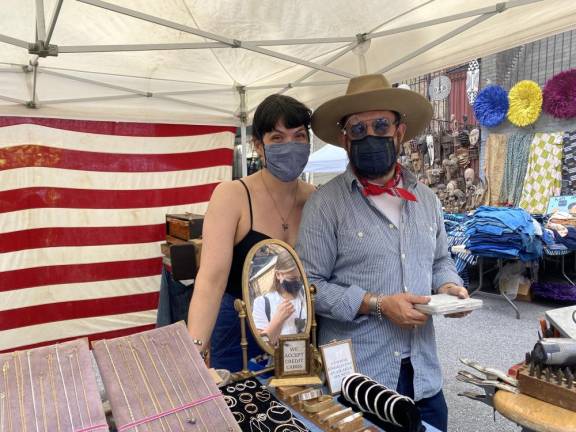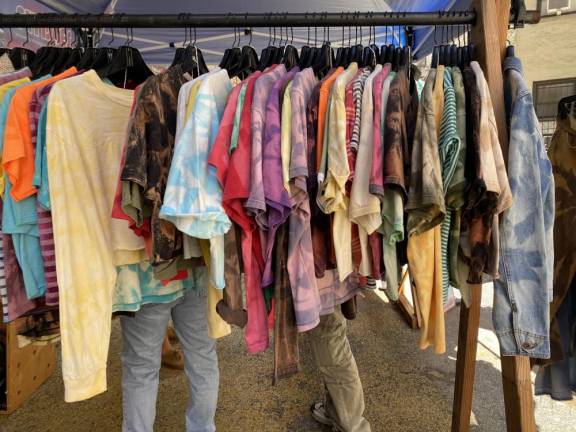Chelsea Flea Reopens
The market overcomes hurdles with new management and a new vibe





“Chelsea Flea ... what a lot of people will tell you about it is, ‘Oh yeah I bought an end table there over 25 years ago, when I was 22 years old, but I’ve haven’t gone back there in so long because the vendors are always really ornery,’” said Eric Demby, co-founder of Brooklyn Flea. “And that’s kind of the charm of it. But I think that in this day and age, that makes you a relic.”
On September 12 Chelsea Flea opened for the first time in nine months. It has faced two major hurdles since closing: a change of ownership, and COVID-19. December 28 was the last weekend the market was open before the shutdown, and under its previous owners. At that point, as far as the average antique shopper knew, it was over.
Demby and his partner Jonathan Butler, who co-founded the Brooklyn Flea, were in the works of signing a contract with the “complicated ownership” of the parking lot on 25th Street between Fifth and Sixth Avenues, where the market has lived and breathed for over 40 years. They had known since the fall of 2019 that they would be taking over Chelsea Flea, but the agreement wasn’t yet signed.
“There were these stories that were being written back in November and December about how the market was closing,” Demby said. “And we couldn’t be a part of those stories in the way that we thought we were going to be able to, or we would be able to just say ‘It’s not closing, we’re taking it over.’”
In January it was finally announced that the market planned to reopen under Brooklyn Flea’s management in early April.
“We felt really good about opening in April, but like anything else, this all happened,” Demby said of the pandemic.
After the city shut down, Demby said he spent his time figuring out how to make the market as safe as possible.
“A couple months ago, the thought of having a market open to the public seemed sort of absurd,” he said. “But now it feels, maybe not perfect, but okay, and this weekend everybody felt comfortable out there.”
New Food Section
The white tents were set up, the booths full of unexpected, if dusty, finds, and masked shoppers wandered from vendor to vendor. Bottles of hand sanitizers were placed at the base of several tents. There was a new food section added, and next week, now that they have their liquor license, there will be a small bar. Demby said there were about 50 vendors on Saturday and 40 on Sunday, which is close to their full capacity to allow room for social distancing between the booths.
The vendors — who have been pent up in their homes for months — felt like kids set loose in a toy store. Many of the vendors were regulars of Brooklyn Flea. Demby said some of the regular Chelsea Flea vendors were hesitant to jump back in feet-first, and instead came by to check out the market and see how it was doing. “They didn’t want to be the guinea pigs,” he said.
Thea Grant, co-owner of “Thea Grant Jewelers of the Old,” stood under a tent in a denim-blue mask, selling handmade jewelry. She and her husband have been with Brooklyn Flea for six or seven years. They have a store in DUMBO, and during the shutdown, they had to improvise to keep the business running by setting up on the street in front of the store and asking other market vendors to join them.
“We were confident the markets were going to be able to come back, because we saw people wanting to consume, wanting to buy — most of them wanting to interact,” she said.
Chris Ventriglia, owner of FlyDyes, a women’s tie-dye clothing business, was tucked in the shaded alley between two buildings at the back of the lot. He’s from Asbury Park, NJ, and has been back at markets in New Jersey for a while. Back when COVID hit, he had plans to travel to multiple states for his business, but it all was scrapped.
“I bought a new truck last year for it,” he said. “And then 2020 just plummeted.” He pivoted to focus on his online Etsy store.
“I think that first couple weeks of the scare being at a high, everyone didn’t know what to do, you know?” he said. “At that point, I was just worried about keeping a roof over my head.”
Ventriglia noticed that since the lockdown, customers seem to be more interested in shopping small businesses like his, rather than turning towards bigger brands.
Unrelenting Optimism
Then there was “Kathy Hates Surprises Vintage,” run by Courtney Waltimyer and Ri Kennedy, two roommates from Brooklyn who recently started this as a side business. Saturday at Chelsea Flea was their second market as vendors. Surrounded by pastel colored glassware, cake plates, candlestick holders, and whimsically striped shot glasses on a pink tablecloth, they talked about loving “the hunt” for the perfect item at estate sales. Despite the overarching threat of COVID, flea-ers gotta flea.
These sellers have something in common: unrelenting optimism. They’re missing that “ornery” quality that Chelsea Flea is known for. Demby would attribute this to “a different vibe.”
“I think that they were ornery because they weren’t being treated well,” he said. “Not because they’re mean people.”
Vendors have claimed that the previous owners, Alan and Helene Boss, had a reputation of treating their vendors poorly.
Demby’s goal is to build back the trust between the management and the vendors. When they took the market over, he said the vendors “were relieved, and they’re still a little injured by those years of that. We’re kind of at the early stages of that.”
The management will start by helping some of the more traditional vendors move into the digital age to boost their sales. The new management will help the “old school” vendors learn how to get on social media to promote their business like the younger vendors.
“We have a collaborative relationship with our vendors,” he said. “We are going to be working with them to develop their own followings. We’ve done this in Brooklyn, and it’s worked.”
Demby hopes to draw a younger crowd of shoppers with the food and drink add-ons, but he’s holding onto the old Chelsea Flea charm.
“The idea from the beginning has always been for the core of this market to be for the vendors who have been there for a long time,” he said. “That’s what that market is, and the people that buy from them, know them. It has its own little ecosystem.”
“A couple months ago, the thought of having a market open to the public seemed sort of absurd. But now it feels, maybe not perfect, but okay, and this weekend everybody felt comfortable out there.” Eric Demby, co-founder of Brooklyn Flea